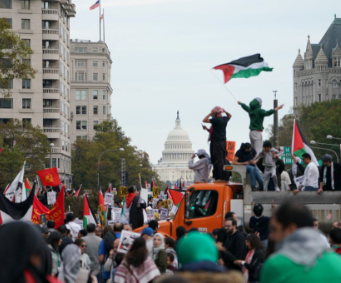Biden Administration Shifts Position in Midst of Israel-Hamas War

by Evelyn San Miguel ’26 
As Israel has continued to wage its war against the terrorist group Hamas in Gaza, the United States, and more specifically the Biden Administration, has faced increasing pressures to shift its diplomatic approach. Israel’s latest aerial missions in the strip have seen significant civilian casualties, adding to the over 34,000 Gazans dead since the beginning of the war, with members of prominent aid groups also being caught in the crossfire. Most notable were seven members of José Andrés’ World Central Kitchen who, on April 1, were killed in an Israeli airstrike.
The organization is one of the few aid groups allowed by the Israeli government in the Gaza Strip, and following the deaths of their members, the group immediately ceased sending aid to the region. President Biden condemned the airstrike and Israel’s stringent aid policy. “Israel has not done enough to protect aid workers trying to deliver desperately needed help to civilians,” he said in a statement.
Biden has struggled with Israeli President Benjamin Netanyahu in private, criticizing his stubborn approach and handling of the war as a ‘mistake.’ In months prior to the rift, Biden had provided full and undivided support to Israel, sitting in Netanyahu’s war council in November and condemning Hamas for their attacks on October 7, as well as providing Israel with military aid and monetary funding. While ceasefire talks remain blurry, the U.S. military, in response to the lack of aid to people in Gaza, has begun building a temporary humanitarian aid pier set to be finished in early May. The floating pier off the coast of Gaza will bring in multiple aid ships a day, ensuring support as well as that no U.S. troops set foot in Gaza, one of the promises Biden set early into the war’s tenure.
Ceasefire has been a difficult subject to breach. Communications and negotiations have been made between both the Israeli government and Hamas, arranging several temporary, weeklong ceasefires in months prior; however, Israel and Hamas are uncompromising in their agreements. Several UN drafts calling for a ceasefire have been proposed, with the Security Council demanding an immediate ceasefire in March.
As the war has stretched on, protests have broken out across the globe and on college campuses, with students at Columbia, Harvard, Yale, NYU, American, and others setting up encampments in pavilions and squares. Just some of the protesters’ main goals are raising awareness and seeking that their colleges divest from companies that support Israel. As the protests have continued, many have been involved in violent altercations leading to riots, with police forces being called on the protesters for their forced removal. Biden, on Thursday, urged for “peace” on campuses, taking no side on the issue except for a message of non-violence.
Recently, talks of a ceasefire have become closer to reality as Hamas has sent a delegation to Egypt with both American and Egyptian mediators reporting signs of compromise, according to the AP. As the talks continue, Israel has proceeded with plans to airstrike Rafah, a border city between Gaza and its neighbor, Egypt. While promising, fruitful negotiations seem unlikely, many are still holding out hope for an end to the deadly conflict.